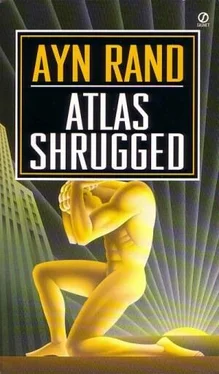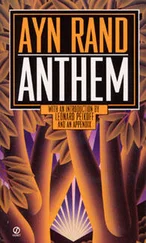The passengers of the Comet were peering out of the windows; some were descending the steps and approaching. Women's faces peeked from the wagons, from among the piles of household goods; a baby wailed somewhere at the rear of the caravan.
"Are you crazy?" asked Eddie Willers.
"No, I mean it, brother. We got plenty of room. We'll give you folks a lift—for a price—if you want to get out of here." He was a lanky, nervous man, with loose gestures and an insolent voice, who looked like a side-show barker.
"This is the Taggart Comet," said Eddie Willers, choking.
"The Comet, eh? Looks more like a dead caterpillar to me. What's the matter, brother? You're not going anywhere—and you can't get there any more, even if you tried."
"What do you mean?"
"You don't think you're going to New York, do you?"
"We are going to New York."
"Then . . . then you haven't heard?"
"What?"
"Say, when was the last time you spoke to any of your stations?"
"I don't know! . . . Heard what?"
"That your Taggart Bridge is gone. Gone. Blasted to bits. Sound-ray explosion or something. Nobody knows exactly. Only there ain't any bridge any more to cross the Mississippi. There ain't any New York any more—leastways, not for folks like you and me to reach."
Eddie Willers did not know what happened next; he had fallen back against the side of the engineer's chair, staring at the open door of the motor unit; he did not know how long he stayed there, but when, at last, he turned his head, he saw that he was alone. The engineer and the fireman had left the cab. There was a scramble of voices outside, screams, sobs, shouted questions and the sound of the side-show barker's laughter.
Eddie pulled himself to the window of the cab: the Comet's passengers and crew were crowding around the leader of the caravan and his semi-ragged companions; he was waving his loose arms in gestures of command. Some of the better-dressed ladies from the Comet—whose husbands had apparently been first to make a deal—were climbing aboard the covered wagons, sobbing and clutching their delicate makeup cases.
"Step right up, folks, step right up!" the barker was yelling cheerfully.
"We'll make room for everybody! A bit crowded, but moving—better than being left here for coyote fodder! The day of the iron horse is past! All we got is plain, old-fashioned horse! Slow, but sure!"
Eddie Willers climbed halfway down the ladder on the side of the engine, to see the crowd and to be heard. He waved one arm, hanging onto the rungs with the other. "You're not going, are you?" he cried to his passengers. "You're not abandoning the Comet?"
They drew a little away from him, as if they did not want to look at him or answer. They did not want to hear questions their minds were incapable of weighing. He saw the blind faces of panic.
"What's the matter with the grease-monkey?" asked the barker, pointing at Eddie.
"Mr. Willers," said the conductor softly, "it's no use . . ."
"Don't abandon the Comet!" cried Eddie Willers. "Don't let it go! Oh God, don't let it go!"
"Are you crazy?" cried the barker. "You've no idea what's going on at your railroad stations and headquarters! They're running around like a pack of chickens with their heads cut off! I don't think there's going to be a railroad left in business this side of the Mississippi, by tomorrow morning!"
"Better come along, Mr. Willers," said the conductor.
"No!" cried Eddie, clutching the metal rung as if he wanted his hand to grow fast to it.
The barker shrugged. "Well, it's your funeral!"
"Which way are you going?" asked the engineer, not looking at Eddie.
"Just going, brother! Just looking for some place to stop . . . somewhere. We're from Imperial Valley, California. The 'People's Party' crowd grabbed the crops and any food we had in the cellars. Hoarding, they called it. So we just picked up and went. Got to travel by night, on account of the Washington crowd. . . . We're just looking for some place to live. . . . You're welcome to come along, buddy, if you've got no home—or else we can drop you off closer to some town or another."
The men of that caravan—thought Eddie indifferently—looked too mean-minded to become the founders of a secret, free settlement, and not mean-minded enough to become a gang of raiders; they had no more destination to find than the motionless beam of the headlight; and, like that beam, they would dissolve somewhere in the empty stretches of the country.
He stayed on the ladder, looking up at the beam. He did not watch while the last men ever to ride the Taggart Comet were transferred to the covered wagons.
The conductor went last. "Mr. Willers!" he called desperately.
"Come along!"
"No," said Eddie.
The side-show barker waved his arm in an upward sweep at Eddie's figure on the side of the engine above their heads. "I hope you know what you're doing!" he cried, his voice half-threat, half-plea. "Maybe somebody will come this way to pick you up—next week or next month! Maybe! Who's going to, these days?"
"Get away from here," said Eddie Willers.
He climbed back into the cab—when the wagons jerked forward and went swaying and creaking off into the night. He sat in the engineer's chair of a motionless engine, his forehead pressed to the useless throttle.
He felt like the captain of an ocean liner in distress, who preferred to go down with his ship rather than be saved by the canoe of savages taunting him with the superiority of their craft.
Then, suddenly, he felt the blinding surge of a desperate, righteous anger. He leaped to his feet, seizing the throttle. He had to start this train; in the name of some victory that he could not name, he had to start the engine, moving, Past the stage of thinking, calculation or fear, moved by some righteous defiance, he was pulling levers at random, he was jerking the throttle back and forth, he was stepping on the dead man's pedal, which was dead, he was groping to distinguish the form of some vision that seemed both distant and close, knowing only that his desperate battle was fed by that vision and was fought for its sake.
Don't let it go! his mind was crying—while he was seeing the streets of New York—Don't let it go!—while he was seeing the lights of railroad signals—Don't let it go!—while he was seeing the smoke rising proudly from factory chimneys, while he was struggling to cut through the smoke and reach the vision at the root of these visions.
He was pulling at coils of wire, he was linking them and tearing them apart—while the sudden sense of sunrays and pine trees kept pulling at the corners of his mind. Dagny!—he heard himself crying soundlessly—Dagny, in the name of the best within us! . . . He was jerking at futile levers and at a throttle that had nothing to move. . . . Dagny!—he was crying to a twelve-year-old girl in a sunlit clearing of the woods—in the name of the best within us, I must now start this train! . . . Dagny, that is what it was . . . and you knew it, then, but I didn't . . . you knew it when you turned to look at the rails. . . . I said, "not business or earning a living" . . . but, Dagny, business and earning a living and that in man which makes it possible—that is the best within us, that was the thing to defend . . . in the name of saving it, Dagny, I must now start this train. . . .
When he found that he had collapsed on the floor of the cab and knew that there was nothing he could do here any longer, he rose and he climbed down the ladder, thinking dimly of the engine's wheels, even though he knew that the engineer had checked them. He felt the crunch of the desert dust under his feet when he let himself drop to the ground. He stood still and, in the enormous silence, he heard the rustle of tumbleweeds stirring in the darkness, like the chuckle of an invisible army made free to move when the Comet was not. He heard a sharper rustle close by—and he saw the small gray shape of a rabbit rise on its haunches to sniff at the steps of a car of the Taggart Comet. With a jolt of murderous fury, he lunged in the direction of the rabbit, as if he could defeat the advance of the enemy in the person of that tiny gray form. The rabbit darted off into the darkness—but he knew that the advance was not to be defeated.
Читать дальше










